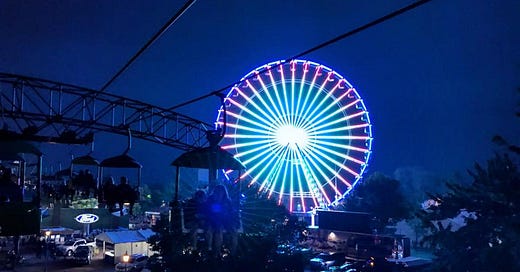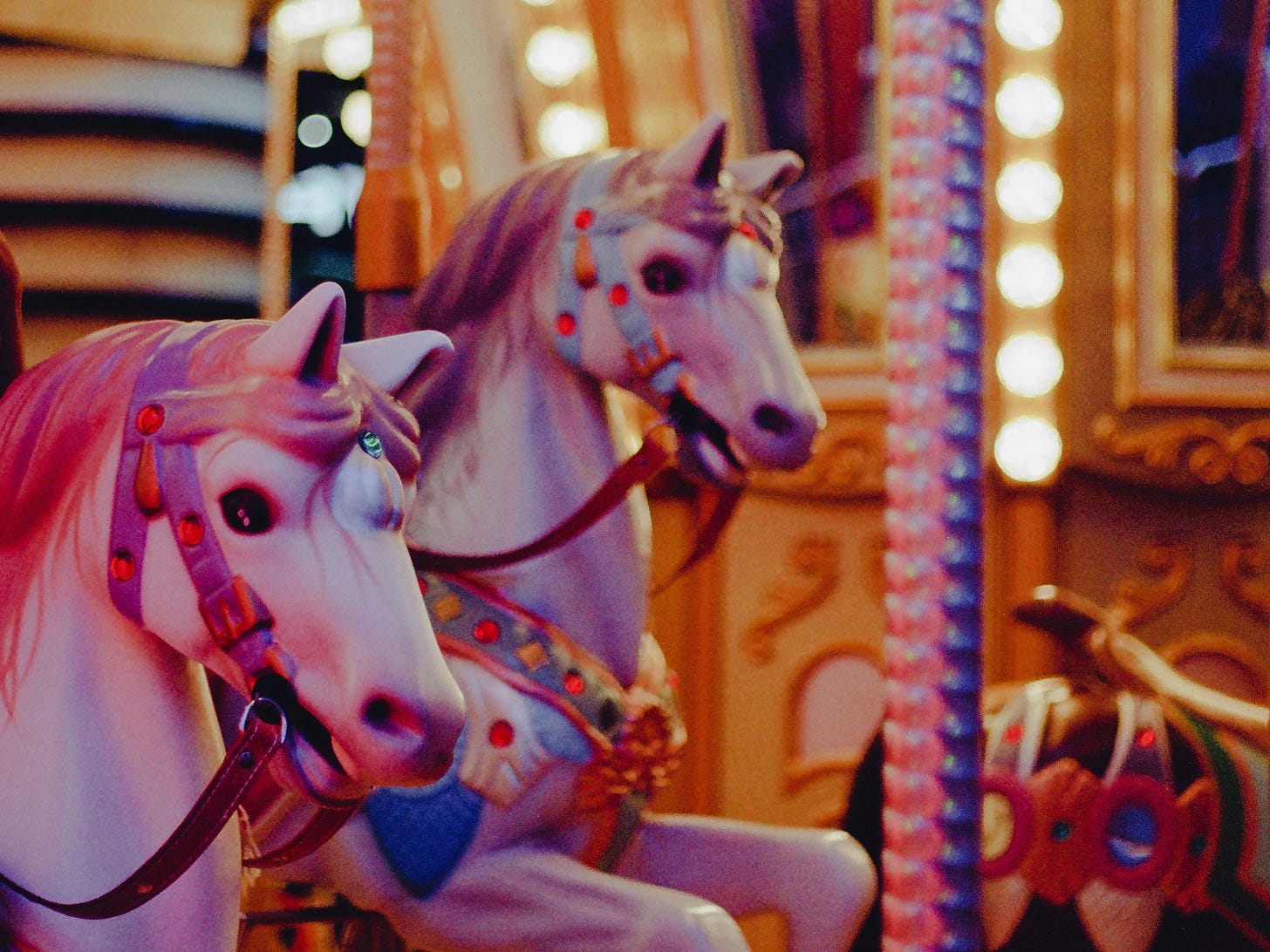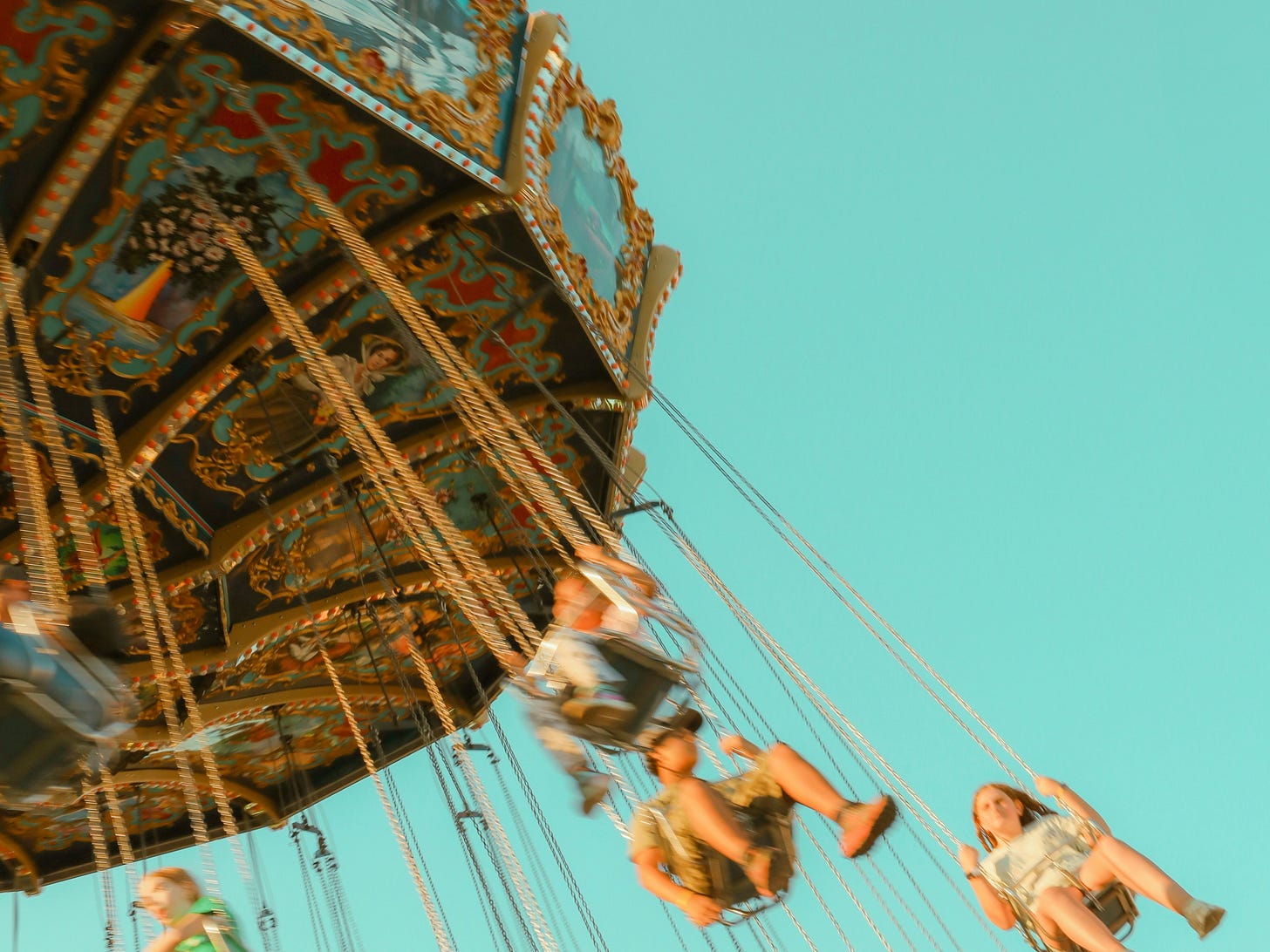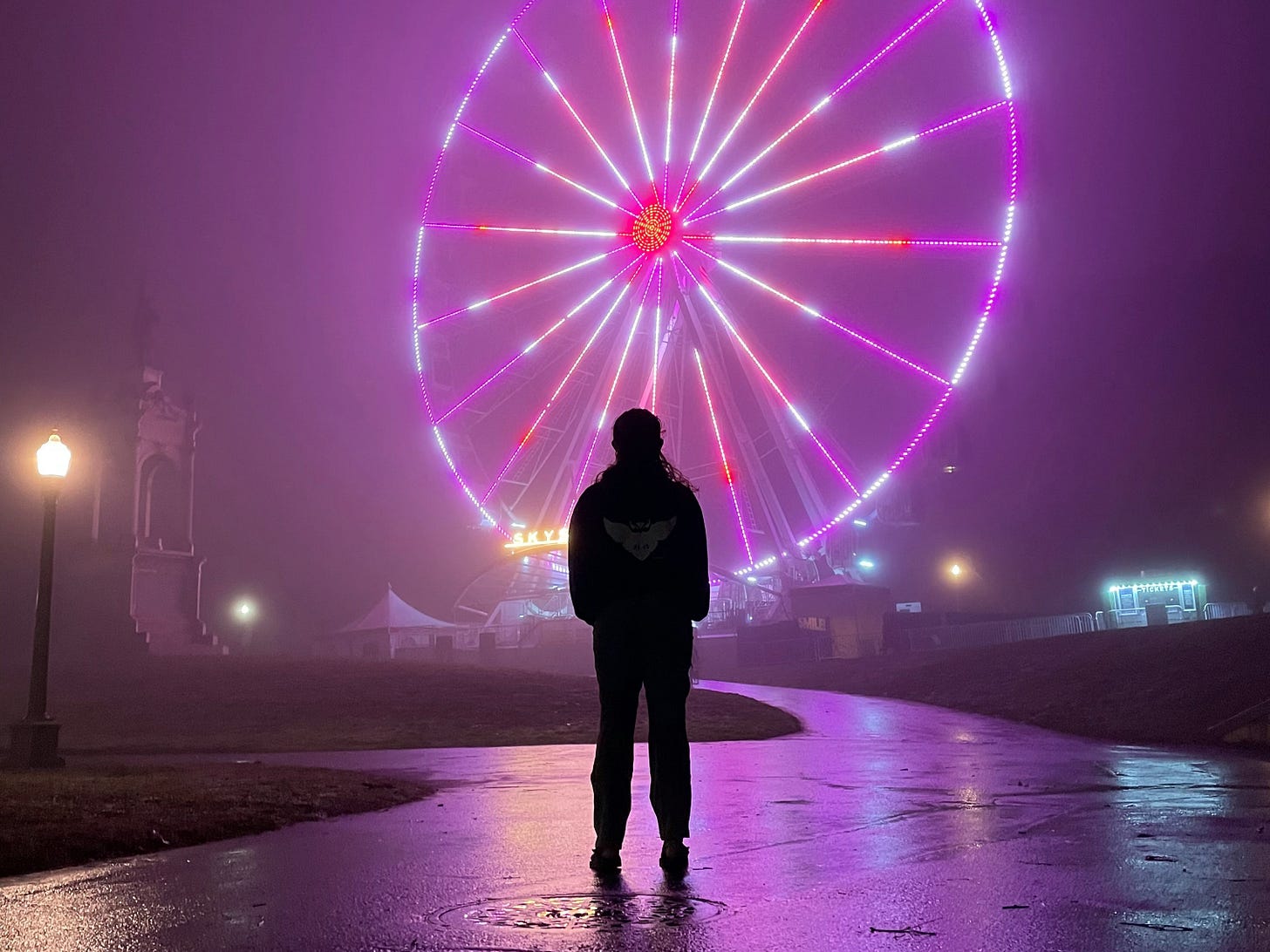What the Minnesota State Fair Taught Me About Outgrowing My Past
On nostalgia, identity, and the courage to outgrow yourself
I’d gone to the Minnesota State Fair nearly every year since I was a kid. It was one of my all-time favorite pastimes.
The festive energy of people soaking up sunshine and spending joyful time with family and friends. The fried food and just-about-everything on a stick. The live music. The neon-lit nights of dizzying rides.
It was a treasured tradition.
Growing up in Minnesota, the Fair was essentially our miniature Midwestern Disneyland—beloved by locals and one of the biggest state fairs in the United States.
A few summers ago, I went again. But this time, within just a few hours, I felt like I needed to escape.
The crowds, the noise, the overstimulation didn’t feel like fun anymore—it felt like panic. The greasy food I used to indulge in without a second thought now felt like an assault on my senses.
What’s wrong with me?
It caught me off guard. What once felt like a familiar ritual now felt like chaos.
So I left.
Shortly after, I found myself back at the park & ride, walking alone along the train tracks just to hear my own thoughts again. I’ll never forget that feeling: the warmth of the sun, the tall grass tickling my legs, and a subtle sense of worry setting in.
The whole experience stirred something deeper than just sensory overload. It unearthed a quiet, pressing grief:
What once lit me up no longer does.
And maybe it never will again.
Maybe that sounds silly to some. There are plenty of people who won’t relate to what I’m saying, and that’s okay.
But here’s what I’ve come to believe:
Nostalgia can be beautiful—until it holds us back from the life we’re living now.
And one of the hardest, most sacred things you can do in this life is outgrow your former self.
The problem with “staying true to yourself”
In our culture, we tend to glorify a very specific idea of authenticity: Be yourself. Stay true to who you are. Don’t forget where you came from.
Those statements can be helpful, but they can also become cages, depending on the context.
What if the version of “you” that others remember simply doesn’t fit anymore?
I’ve lived away from home for years—in different countries, among different cultures. I’ve picked up new languages, friendships, rhythms, and philosophies. Between 2019 and 2020, I lost 90 pounds and overhauled my lifestyle.
All of this caused massive shifts in my mindset and preferences. In certain ways, I became unrecognizable to my old self. And for me, that was mostly a good thing.
But when you return home after big life changes, it’s natural to expect reunion. Reconnection. Maybe even celebration.
Sometimes, what happens instead is misrecognition.
Friends and family members might say, “You’ve always loved this, why don’t you want to go?”
Or: “That’s not like you.”
Or worse: “You’ve changed.”
Yes. I have changed.
Ultimately, we expect people to stay the same because it makes us feel safer. It’s predictable and familiar.
But that doesn’t mean it’s true to who they are now.
You’re allowed to let go of what you once loved
That might sound sacrilegious in a world obsessed with origin stories, but:
Growth isn’t betrayal. It’s transformation.
There’s a feeling of shame that can creep in when you stop loving the things that once defined you. Maybe it was a hobby. A role you played in your family. A tradition. A dream.
We cling to those things because they helped us make sense of who we were. They gave us structure, identity, joy.
But you're allowed to release them when they stop feeling like home.
Leaving the fair that day was my way of honoring myself. Not because I’ve stopped loving everything about it, but because in that moment, it didn’t feel good. It wasn’t helping me, and I didn’t feel connected or joyful.
And that was enough of a reason to walk away.
“Home is where the heart is,” you’ve probably heard.
But beyond a place, home becomes a feeling. A philosophy. A sense of alignment.
Sometimes we outgrow the spaces, routines, or roles that once made us feel at home—not because they were wrong, but because we’ve changed. And staying out of obligation, nostalgia, or pressure to “stay true to yourself” (read: your historical self) doesn’t serve anyone.
You can still honor your past without dragging it into your present.
You can still love your favorite things.
Growth is simply knowing when to hold on, and when to let go.
Nostalgia is a portal, not a place to live
Throughout my 20s, I was madly in love with nostalgia.
I’d go out of my way to revisit old favorites—places, people, music, meals, memories—anything that gave me a glimpse of the past. I relived it all like a song on repeat, until the magic wore off and it started to hurt.
Maybe I was looking for comfort in times of uncertainty. Maybe I was trying to hold on to a version of myself I was afraid of losing. Or, maybe it was just plain attachment.
Whatever the reason, I don’t think nostalgia is inherently bad.
Nostalgia is a beautiful portal into who we were, what shaped us, and what mattered. But it’s not a place to live.
There’s a fine line between honoring your past and being haunted by it, and I think a lot of us walk that line daily.
This is especially true for artists, creators, makers, thinkers, and builders. We live unconventional lives, move countries, pivot careers, and follow strange muses. We rebuild our identities again and again—sometimes out of necessity, sometimes out of curiosity, and sometimes because staying the same would mean shrinking.
It’s not always glamorous. In fact, it’s often lonely. We feel misunderstood, our new selves rubbing up against old expectations.
Becoming someone new sometimes means disappointing the version of you others are still holding onto.
So what happens when the people closest to you keep trying to pull you back into who you used to be? That’s when a very peculiar kind of heartache sets in: Maybe they don’t know me anymore. Maybe they never really did.
I’m not saying the people around you automatically hold you back. If you have a support system that celebrates your growth, you’ve truly won the lottery in life. But not everyone’s that lucky—and for those who’ve had to grow beyond what others can understand, the path can feel deeply solitary.
The new conformity of nonconformity
Here’s a plot twist:
In 2025, being unconventional is no longer rebellious.
It’s almost expected.
Digital nomads, freelance creatives, location-independent entrepreneurs, alternative paths—it’s all become trendy and popular. And while that’s opened doors for a lot of us, it’s also created a new kind of pressure:
Be consistently unconventional. Be un-achievably unique.
The truth is, whatever becomes a trend, becomes just another mold, another role to play.
Sometimes the most radical thing you can do is simply not chase novelty.
Sometimes it’s staying home, or slowing down.
Sometimes it’s letting go of things that used to scream “this is so me”.
Sometimes, it’s simply loosening your grip on identity in order to make room for intentionality.
Real rebellion is choosing what fits right now—not what you used to want, and not what someone else has decided your future should look like.
You’re allowed to disappoint others.
You don’t need a dramatic reason to evolve. You can wake up one day and say, “This used to serve me and it doesn’t anymore.”
No grand explanation needed.
So where does that leave us?
Maybe I’ll go back to the Minnesota State Fair someday. I still love the animals, the art displays, the live music, the neon lights, and the adrenaline of a high-speed thrill ride (though I trust them less now than I did at 17).
Outgrowing something doesn’t necessarily mean turning your back on it forever. Sometimes it just means recognizing that what once fit perfectly now needs to be approached on new terms:
Where we carry our memories like postcards, not contracts.
Where we visit the past with reverence, not obligation.
Where we honor who we were, but don’t submit to anyone else’s image of us.
If you’ve ever walked away from something you once loved with a quiet ache in your chest, know this:
You’re not broken.
You haven’t lost your joy.
You’re simply becoming someone new.
That’s the gift (and the grief).
The letting go, and the becoming.
The portal—not the prison.
What’s something you used to love that no longer fits you? And what are you making space for now? Hit reply or leave a comment below.
Subscribe to New Renaissance Tribe and get weekly reflections on artful living, intentional travel, self-discovery, and the pursuit of a modern Renaissance.










Love me some state fairs! Now I’m nostalgic to go to one this summer 🎡🎠